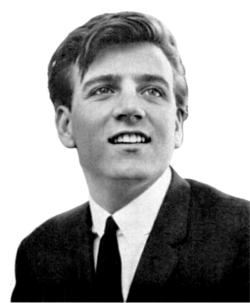Billy J. Kramer
| Billy J. Kramer | |
|---|---|

Billy J. Kramer, 1965
|
|
| Background information | |
| Birth name | William Howard Ashton |
| Born |
19 August 1943 Bootle, Lancashire, England |
| Origin | Liverpool, Lancashire, England |
| Genres | Pop, Merseybeat, British rock and roll |
| Occupation(s) | Singer |
| Instruments | Vocals |
| Years active | 1963–present |
| Labels | Parlophone |
| Associated acts |
The Dakotas The Beatles |
| Website | BillyJKramer.com |
William Howard Ashton, better known by the stage name Billy J. Kramer (born 19 August 1943 in Bootle, Lancashire, England) is a pop singer. In the 1960s he was managed by Brian Epstein, who also managed The Beatles, and he recorded several original Lennon and McCartney compositions.
He grew up as the youngest of seven siblings and attended the St George of England Secondary School, Bootle. He then took up an engineering apprenticeship with British Railways and in his spare time played rhythm guitar in a group he had formed himself, before switching to become a vocalist. The performing name Kramer was chosen at random from a telephone directory. It was John Lennon's suggestion that the "J" be added to the name to further distinguish him by adding a "tougher edge". Kramer soon came to the attention of Brian Epstein, ever on the look-out for new talent to add to his expanding roster of local artists. Kramer turned professional but his then backing group, the Coasters, were less keen, so Epstein sought out the services of a Manchester-based group, the Dakotas, a combo then backing Pete MacLaine.
Even then, the Dakotas would not join Kramer without a recording contract of their own. Once in place, the deal was set and both acts signed to Parlophone under George Martin. Collectively, they were named Billy J. Kramer with the Dakotas to keep their own identities within the act. Once the Beatles broke through, the way was paved for a tide of Merseybeat and Kramer was offered the chance to cover "Do You Want to Know a Secret?", first released by the Beatles on their own debut album, Please Please Me. The track had been turned down by Shane Fenton (later known as Alvin Stardust) who was looking for a career-reviving hit.
...
Wikipedia
